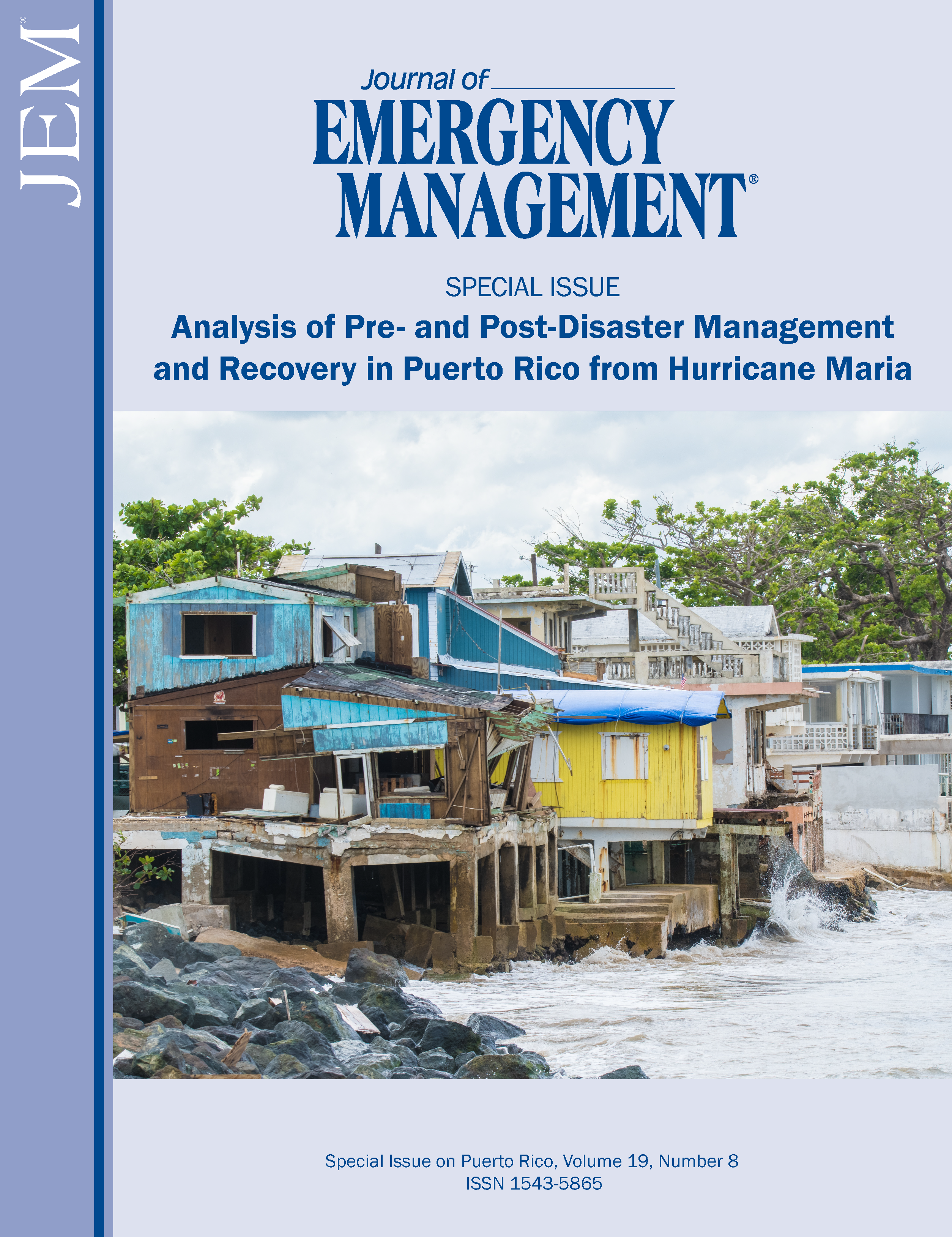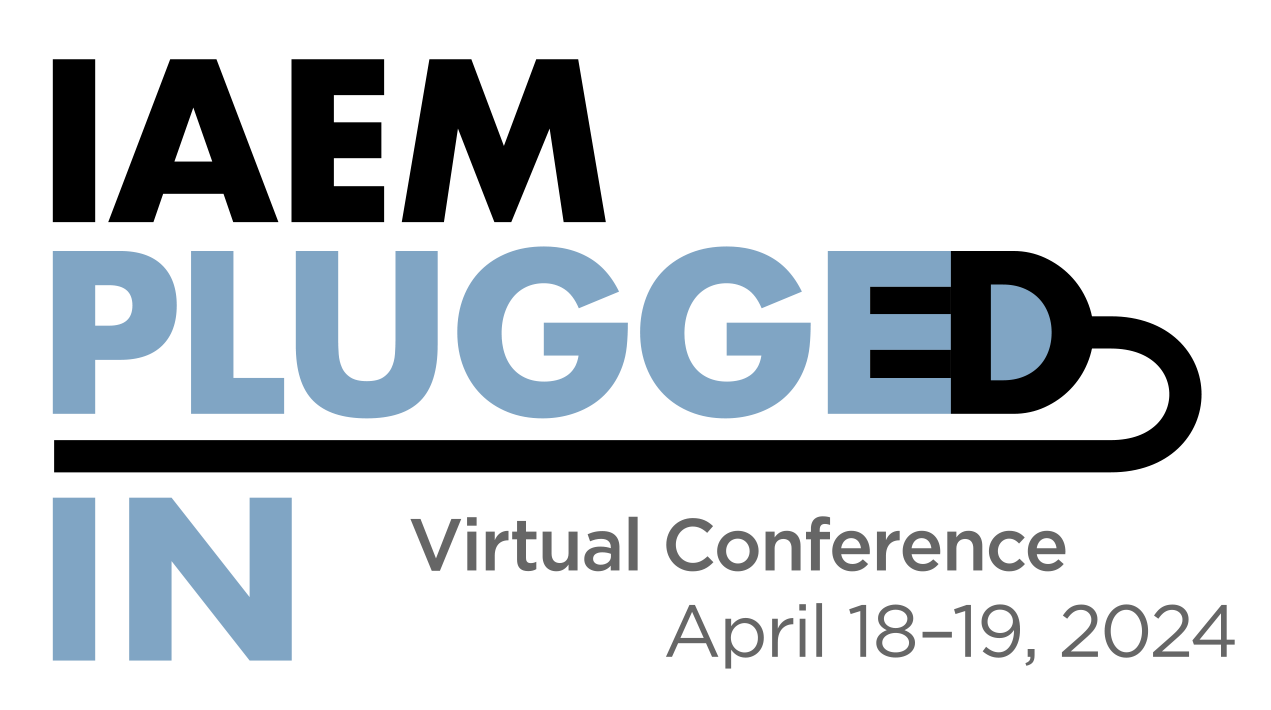Six months after Maria: A post-hurricane examination of mental health and associated risk factors in older Puerto Ricans
DOI:
https://doi.org/10.5055/jem.0635Keywords:
disaster response, mental health, Hurricane Maria, depression, water, utility restoration, elderly, older adultsAbstract
Following Hurricanes Irma and Maria in September 2017, there were elevated rates of depression and suicide in Puerto Rico. This study evaluates mental health in older and elderly Puerto Ricans 6 months after the hurricanes and suggests strategies for improving future psychosocial responses. Patients attending clinics were evaluated for depression (Patient Health Questionnaire [PHQ-9]) and suicide risk (Ask Suicide-Screening Questions [ASQ]) and were surveyed about their perceived safety, designated as a proxy for anxiety. Used in conjunction, PHQ-9 and ASQ were found to identify a greater proportion of individuals experiencing adverse mental health effects than if each instrument was used in isolation. Patients were also surveyed about time to water and electricity restoration, and it was found that prolonged time to water restoration was associated with increased prevalence and severity of depression and decreased perceived safety. Based on collected patient data (n = 523), using multiple mental health screening tools for diagnosis, improving perceptions of home safety or anxiety, and prioritizing water restoration may reduce mental health sequelae in the elderly and enhance the effect of psychosocial responses following disasters.
References
LaJoie AS, Sprang G, McKinney WP: Long-term effects of Hurricane Katrina on the psychological well-being of evacuees. Disasters. 2010; 34(4): 1031-1044.
Amundson D, Dadekian G, Etienne M, et al.: Practicing internal medicine onboard the USNS COMFORT in the aftermath of the Haitian earthquake. Ann Intern Med. 2010; 152(11): 733-737.
Lindell MK: Disaster studies. Curr Sociol. 2013; 61(5-6): 797-825. 4. Willison C, Singer P, Creary M, et al.: Quantifying inequities in US federal response to hurricane disaster in Texas and Florida compared with Puerto Rico. BMJ Glob Health. 2019; 4(1): e001191.
World Health Organization: Mental health in emergencies. WHO Fact Sheets. Geneva: World Health Organization, 2019.
Lin S, Lu Y, Justino J, et al.: What happened to our environment and mental health as a result of Hurricane Sandy? Disaster Med Public Health Preparedness. 2016; 10: 314-319.
Cuthbertson C, Newkirk C, Ilardo J, et al.: Angry, scared, and unsure: mental health consequences of contaminated water in Flint, Michigan. J Urban Health. 2016; 93(6): 899-908.
Tierney K, Bruneau M: Conceptualizing and measuring resilience: A key to disaster loss reduction. Transport Res News. 2007; 250: 14-17.
Topping K, Schwab J: Chapter 3: Disaster recovery planning: Expectations versus reality. In Schwab J (ed.): Planning Advisory Service Report 576: Planning for Post-Disaster Recovery: Next Generation. Chicago, IL: American Planning Association, 2014; pp. 42-59.
Galea S, Nandi A, Vlahov D: The epidemiology of post-traumatic stress disorder after disasters. Epidemiol Rev. 2005; 27(1): 78-91.
Vipler B, Nissan D, Darling N, et al.: Disaster response to Puerto Rico: An internal medicine Humanitarian response aboard the USNS COMFORT. Mil Med. 2018; 183(11-12): 252-257.
Yang Y, Yeh T, Chen C, et al.: Psychiatric morbidity and posttraumatic symptoms among earthquake victims in primary care clinics. Gen Hosp Psychiatry. 2003; 25: 253-261.
Jia Z, Tian W, Liu W, et al.: Are the elderly more vulnerable to psychological impact of natural disaster? A population-based survey of adult survivors of the 2008 Sichuan earthquake. BMC Public Health. 2010; 10: 172.
Ticehurst S, Webster R, Carr V, et al.: The psychosocial impact of an earthquake on the elderly. Int J Geriatr Psychiatry. 1996; 11: 943-951.
Oriol W: Chapter 3: Older persons in disasters. In Nordboe D (ed.): Psychosocial Issues for Older Adults in Disasters. North Bethesda, MD: US Department of Health and Human Services, Substance Abuse and Mental Health Services Administration, Center for Mental Health Services, 1999; pp. 25-42.
Knight B, Gatz M, Heller K, et al.: Age and emotional response to the northridge earthquake: A longitudinal analysis. Psychol Aging. 2000; 15(4): 627-634.
Kato H, Asukai N, Miyake Y, et al.: Post-traumatic symptoms among younger and elderly evacuees in the early stages following the 1995 Hanshin-Awaji earthquake in Japan. Acta Psychiatr Scand. 1996; 93: 477-481.
Cangialosi JP, Latto AS, Berg R: Hurricane Irma (AL112017); 30 August–12 September 2017. Miami, FL: National Hurricane Center, 2018.
Gay H, Santiago R, Gil B: Lessons learned from Hurricane Maria in Puerto Rico: Practical measures to mitigate the impact of a catastrophic natural disaster on radiation.
Pasch RJ, Penny AB, Berg R: National Hurricane Center Tropical Cyclone Report: Hurricane Maria (AL152017), 16-30 September 2017. National Hurricane Center and Central Pacific Hurricane Center, February 14, 2018.
Kishore N, Marques D, Mahmud A, et al.: Mortality in Puerto Rico after Hurricane Maria. N Engl J Med. 2018; 379(2): 162-170.
Dickerson C: After Hurricane, Signs of a Mental Health Crisis Haunt Puerto Rico. New York Times. November 13, 2017.
Schalk SK, Hendrix SR, Nissan DA: The mental health mission aboard the USNS comfort during humanitarian operations in Puerto Rico. Am J Psychiatry. 2018; 175(3): 207-208.
Ferre IM, Negron S, Shultz JM, et al.: Hurricane Maria’s impact on Punta Santiago, Puerto Rico: Community needs and mental health assessment six months postimpact. Disaster Med Public Health Preparedness. 2019; 13(1): 18-23.
Kroenke K, Spitzer RL, Williams JB: The PHQ-9: Validity of a brief depression severity measure. J Gen Intern Med. 2001; 16(9): 606-613.
Kroenke K, Spitzer RL: The PHQ-9: A new depression diagnostic and severity measure. Psychiatr Ann. 2002; 32(9): 509-515.
Horowitz LM, Bridge JA, Teach SJ, et al: Ask Suicide-Screening Questions (ASQ): A brief instrument for the pediatric emergency department. Arch Pediatr Adolesc Med. 2012; 166(12): 1170-1176.
PROMIS Health Organization: LEVEL 2-Anxiety-Adult (PROMIS Emotional Distress-Anxiety Short Form). Evanston, IL: PROMIS Health Organization (PHO) and PROMIS Cooperative Group, 2008-2012.
Shim R, Baltrus P, Ye J, et al.: Prevalence, treatment, and control of depressive symptoms in the United States: Results from the National Health and Nutrition Examination Survey (NHANES), 2005–2008. J Am Board Fam Med. 2011; 24(1): 33-38.
Garand L, Mitchell A, Dietrick A, et al.: Suicide in older adults: Nursing assessment of suicide risk. Issues Ment Health Nurs. 2006; 27(4): 355-370.
Centers for Disease Control and Prevention and National Association of Chronic Disease Directors: The State of Mental Health and Aging in America Issue Brief 1: What Do the Data Tell Us? Decatur, GA: National Association of Chronic Disease Directors, 2008.
US Census Bureau: American FactfinderR. Available at www.factfinder.census.gov. Accessed November 14, 2019.
Published
How to Cite
Issue
Section
License
Copyright 2007-2023, Weston Medical Publishing, LLC and Journal of Emergency Management. All Rights Reserved








